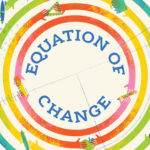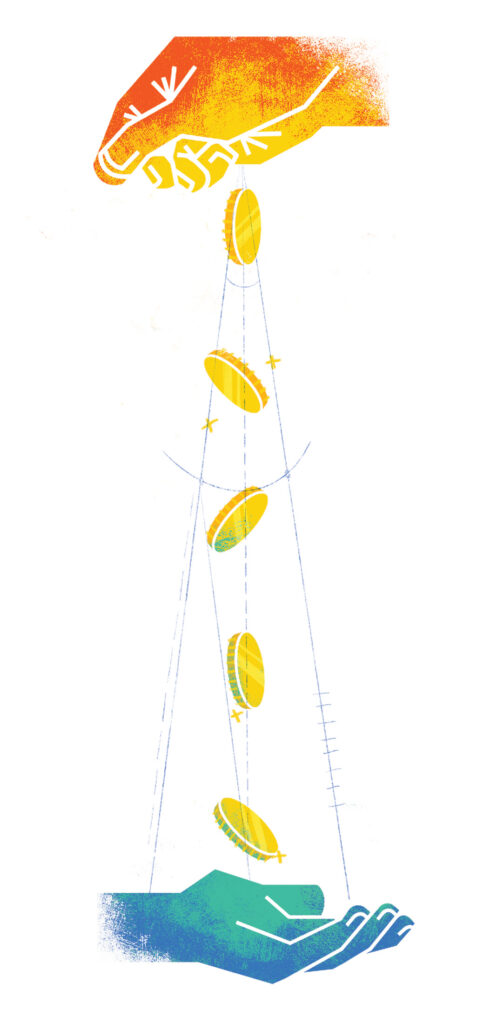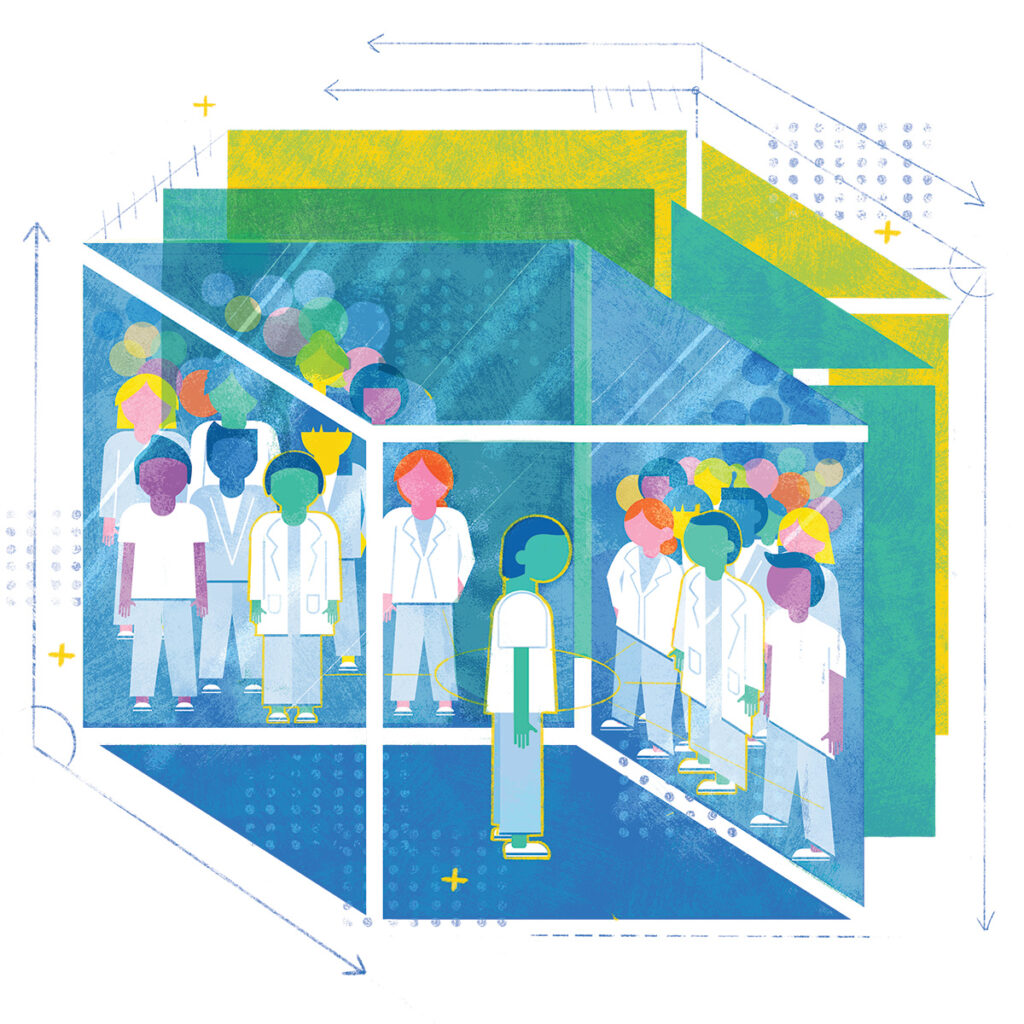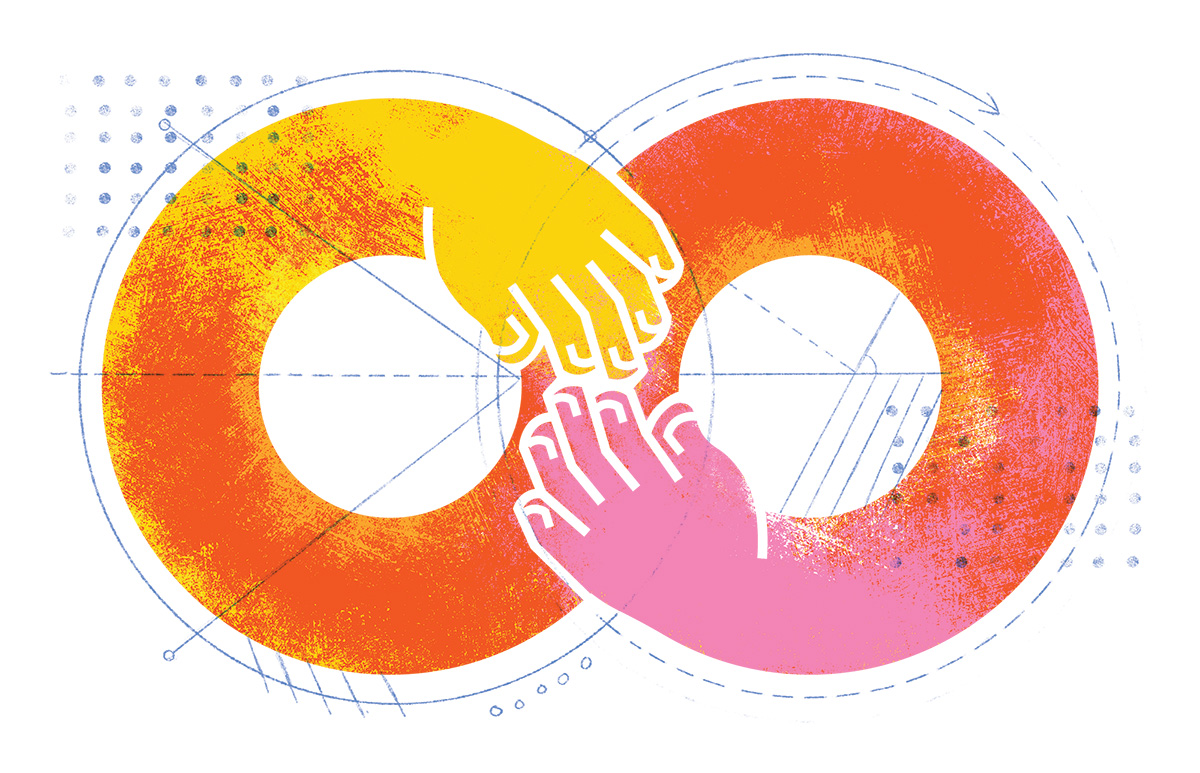
By: Susan Thornton Hobby Illustrations by: Marissa Clayton ’21
At the start of second grade, Freeman Hrabowski’s textbook, wrapped neatly in brown paper, arrived on his desk. His teacher warned the class to keep the book covers in place. But little Freeman was always curious. He peeled off a strip of paper, then another scrap, and another, until he could see the battered cover and a stamp inside, showing that the book had been used by children in the White school nearby.
Freeman marched up to his teacher’s desk. “Why’d they give us their hand-me-down books?” he asked. His teacher’s face, Hrabowski remembered, showed both embarrassment and anger.
“What do you tell a child who’s been told by the world that the child is second class?” Hrabowski recalled.
“She said, ‘You just remember this: You are a child of God. You are first class. The book may not be new, but the knowledge is worth getting. Just get the knowledge and you will be okay.’ So that wonderful teacher was telling me to believe in myself.”
While the hand-me-down books outraged Hrabowski, his teacher’s advice was treasured and passed along to those he has mentored: Believe in yourself. Hrabowski’s legacy is defined by mentoring, both by the parents and educators who guided him and by his hundreds of mentees. Hrabowski’s mentees are legion, whether they arrive from UMBC’s Meyerhoff Scholarship Program, or as the student body president, or just students he’s met on his walks around campus who then ask for his guidance.
It’s simple math. Hrabowski mentors hundreds. Those hundreds mentor thousands. Those thousands mentor hundreds of thousands. The result is Hrabowski’s exponential equation of change.
During the pandemic, Kafui Dzirasa ’01, M8, chemical engineering, texted Hrabowski, the mentor he calls Doc. “I said, ‘Your mentees are literally leading the coronavirus response, one as the U.S. surgeon general [Jerome Adams ’97, M4, biochemistry & molecular biology and psychology]. And the other one’s making a vaccine [Kizzmekia Corbett ’08, M16, biological sciences and sociology]. Your mentoring is literally going to save millions of lives. The end. That’s mentoring.’”
A Nickel and The Hard Truth
Hrabowski’s first mentors were his parents, a college-educated pair of teachers who supported and challenged him. “From my daddy, my father, I learned the importance of remaining calm in challenging times and giving yourself the time to think through the best approach to use in attacking a problem,” Hrabowski said. “From my mother, the importance of connecting right and left brain thinking… In both cases, they were teaching me how to learn, and think, and approach the world.”
By the time he reached high school, Hrabowski was always the one who tried to solve the math problems his principal would write on the chalkboard. He would bring his solutions to the principal’s office and earn a nickel to spend on Tootsie Rolls if they were right. If his equations weren’t correct, his principal would chastise him for carelessness. Both the nickels and the hard truths stuck with him, Hrabowski said, and he uses that tough love to mentor others.

“I’m first working with my mentees to build trust so that the mentee knows I care deeply,” Hrabowski said. “Then if I say something that is not comfortable, or something that maybe she doesn’t want to hear, I’m saying it out of love. I’m, perhaps, saying what others are thinking and won’t say. And I believe that effective mentors want to help students and their mentees to develop tough skin, to want to get constructive and honest feedback, because we can all improve.”
Kate Tracy, M.A. ’01, Ph.D. ’03, psychology, shadowed Hrabowski and was mentored by him as an American Council on Education Fellow. Hrabowski introduced her, connected her, and guided her for the 2019 to 2020 academic year. Never before, she laughed, had she given out a complete box of 500 business cards.
“As a mentor, Freeman is continuously available…he has an amazing amount of energy and he has an incredibly generous heart,” said Tracy, who serves as a professor in the University of Maryland School of Medicine’s Department of Epidemiology and Public Health and advises the University System of Maryland on COVID-19.
Hrabowski can offer hard truths, she said, because he demonstrates how deeply he cares. He often quotes Emily Dickinson: “Tell all the truth but tell it slant.” He recently gave her a “truth bomb,” Tracy said, and she thought, “he’s saying this for my own good, and if he’s willing to say it, I need to hear it.”
She was touched, Tracy said, when later in the day Hrabowski texted her, telling her how proud he was of her, and how hard it must have been to hear what he had to say.
“When you build a trusting relationship and you put relationships at the center of it, people can hear the hard truth because they know you’re doing it for their greatest good and because you believe in them,” Tracy said.
Chelsea Pinnix ’99, M7, biochemistry and molecular biology, said she learned the primacy of honesty from Hrabowski.
“It’s important to be vulnerable to your mentee,” said Pinnix, who is now the residency program director and associate professor in the Department of Radiation Oncology at Anderson Cancer Center. “Being honest about the mistakes you’ve made, about things that you wish you’d done differently. They are learning from your mistakes, but they’re also recognizing that you have these vulnerabilities and that you make mistakes. So then it’s okay for them to make mistakes, too.”
Telling Yourself a Story
Hrabowski’s early life bolstered his eager mind. When young Hrabowski received straight A’s, the entire congregation of his Birmingham church would rise for a 4.0 standing ovation. Starting at age 15, Hrabowski followed the advice of a mentor and started greeting himself in the mirror as “Dr. Hrabowski.”
At monthly family meetings for the Meyerhoff Scholars, Hrabowski instituted both ovations for good grades and the advice to address yourself in the mirror as your goal self. Have high expectations, Hrabowski said, and students will rise to them.
Dzirasa, an associate professor of psychiatry and behavioral sciences at Duke University who was recently elected to the National Academy of Medicine, thought the mirror exercise was “weird,” he said, laughing. “And yet, we did it. It wasn’t until I became a psychiatrist that I was like, wow, there’s an incredible power to self-reinforcement. Despite all the adversity that comes later, if you tell yourself a story, you will believe it.”

The Meyerhoff story began when Robert Embry, former Baltimore City councilman and longtime president of the Abell Foundation, which works to improve the quality of life in Baltimore, met Hrabowski as a young dean at Coppin State College. Embry was impressed by Hrabowski’s intellect, energy, and high expectations.
Embry eventually connected Hrabowski with philanthropist Robert Meyerhoff, who wanted to help Black science scholars. The Meyerhoff Scholars Program emerged. Years later, Hrabowski recruited Embry to join the board at UMBC.
“It didn’t take much,” Embry said. “Anything I could do to help him and to be identified with him and his success.”
The Meyerhoff Scholars Program, with its nationally recognized success in increasing diversity in the sciences, is one of the places Hrabowski practices what he preaches about mentorship.
In the Meyerhoff Program, Pinnix learned Hrabowski’s “superpower,” she said. “He has this profound ability to inspire. And he’s able to convince people of the things that they can accomplish before they even recognize that they can.”
“Focus, focus, focus,” Annica Wayman’99, M6, mechanical engineering, remembers Hrabowski often saying to Meyerhoff Scholars. Offered a Meyerhoff Scholarship on the spot after she introduced Hrabowski at her high school, Wayman later earned her doctorate at Georgia Tech. She worked for nearly a decade at USAID before returning to UMBC in 2018 as the College of Natural and Mathematical Sciences’ associate dean for Shady Grove affairs. As she leads programs like the Translational Life Science Technology bachelor’s degree, Wayman now mentors students herself, offering them support and hard truth, and telling them to focus, focus, focus.
Master the Self
In 1987, Michael Hooker, then the president of UMBC, recruited Hrabowski to the campus and became his mentor. Hrabowski said he learned a piece of wisdom from Hooker: “The hardest task any human being has is to master self.”
Many mentees need to hear that message, Hrabowski said.
Dzirasa, now a Howard Hughes Medical Institute investigator and a neuroscientist researching how genetics interact with environmental stress to affect the brain’s functioning, recalled when he was at his lowest.
After breezing through undergrad as an engineer at UMBC, he arrived at Duke Medical School thinking he didn’t need to memorize things. Or study. He began to fail classes. Then someone stole his identity and charged $40,000 to his credit. He went to see an advisor, who told him he wasn’t used to being a small fish in a big pond.
Feeling restless and despondent, Dzirasa started driving. He hit the Virginia state line. Then Maryland’s. Dzirasa ended up on Hrabowski’s porch, weeping and ready to drop out of medical school. Hrabowski comforted him, told him whatever choice he made would be okay. But maybe, Dzirasa recalls Doc telling him, he could drive back to Duke and try one more time.
A good mentor, Dzirasa said, dusts you off and urges you to persist, then keeps after you. Hrabowski, Dzirasa said with a laugh, loves to commend him, but then say, “you know…” and proceed to critique a portion of his performance.
Now Dzirasa returns to UMBC once a month as part of his appointment at Duke, to mentor students and to recruit Meyerhoff Scholars for his research lab.
“I basically give those kids all of myself, and in a hoodie and sweatpants,” Dzirasa said. “I look exactly like them, I talk exactly like them, I sat in exactly their chair, and I was probably more trouble than they are. It makes people’s dreams so tangible.”
Touching Eternity
Hrabowski remembers what Walter Sondheim, the Baltimore businessman and public servant, used to tell him: “Live life seriously, but don’t take it seriously.”
He thinks of that advice often. “His point was, it’s never quite as bad as you think it is, and don’t ever think you’re quite as important as people want to make you seem.… The human experience is that we leave, and others replace us, and if we’re lucky, we are connected to those people.”
Connections are vital to Hrabowski, and he still mentors current students. Sometimes though, students end up teaching the president.

Landry Digeon, M.A. ’09, intercultural communications, Ph.D. ’20, language, literacy, and culture, remembers meeting Hrabowski at the campus television studio, where he worked on videos Hrabowski was taping. The president wanted to learn Digeon’s native French. “Push me,” he told Digeon three times, before Digeon decided to take him up on it in 2014.
Ever since, Hrabowski has studied French with Digeon, who admires Hrabowski’s humility to be tutored by a student. They speak in French nearly every day, about poetry and culture, sometimes arguing about the different countries’ values.
“I learn more from him than he has learned from me,” Digeon said. “When he has a goal, he doesn’t let go. And I learn by watching how to treat people—you can be a great man, a renowned man, and be kind. And I’ve changed Freeman’s mind occasionally. I want to be like that—open-minded.”
When Hrabowski turns in his homework, usually late at night, the president ends his emails with, “Bonne nuit, mon professeur.”
The perfect conjugation of French verbs and his connections to scientists and leaders around the world aren’t the only benefits mentorship offers Hrabowski.
“There’s a great gratification when you see people evolving, and developing, and doing well, and seeing how they overcome challenges. It inspires me to want to be better,” Hrabowski said.
Wayman believes inspiring mentorship is the first element in the equation of change.
“Saving the world is first transforming the thinking of people, to think critically, to be more open-minded,” Wayman said.
Hrabowski, who still receives notes from people his mother taught 70 years ago, often remembers what his mother said in her dying days: “Teachers touch eternity through their students.”
“Those of us in education, we live through our students,” Hrabowski said. “We live through the people we help because we are paying it forward. We live through them and their actions.”
Read more about Jackie Hrabowski’s approach to mentorship in Because She Can.





